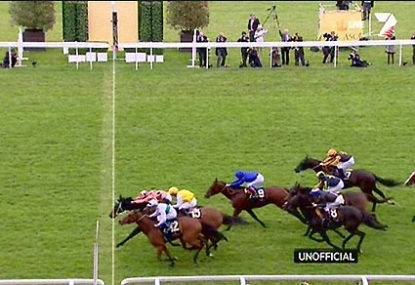TWO GOOD! Zahra wins back-to-back Melbourne Cups on Without a Fight as three horses pull up lame
Without a Fight completed the rare Caulfield Cup-Melbourne Cup double on Tuesday as star jockey Mark Zahra went back-to-back in the big one after…

Black Caviar will be retiring from racing flags at the end of the season. But can we be sure she’ll be a winner in the breeding barn?
Peter Moody has signalled this autumn campaign as the definite end to one of history’s most illustrious racing careers. Unlike most financially-driven retirements though, Black Caviar is of the female gender.
Compared to her male counterparts, Black Caviar’s breeding career is far from a secure investment when she can still contribute so much on the turf.
At six years of age, she is in the back half of her racing career but connections have already ruled her out of racing as a seven-year-old. Earlier in the week, Moody reaffirmed that the champion mare would not be accepting another invite to Royal Ascot and would instead run her final race in Australia.
”It would be a wonderful tribute to her and her fans to have her grand finale on the eastern seaboard,” Moody said.
Sacrificing her unbeaten record will always be in the back of owner’s minds who would undoubtedly like her to retire undefeated. However, the breeding failure of mares that succeeded on the turf is nothing new to the industry which is less forgiving to broodmares than stallions.
As a female, Black Caviar will produce one progeny per year as opposed to the 40-120 which successful stallions produce. Black Caviar’s first and second foals will be a literal hit-or-miss situation in terms of selling her future offspring.
If she retires at the end of autumn and stays healthy throughout her breeding careers, a realistic expectation would be for her to produce 10 foals in her lifetime.
If a few can be even half as talented as their mother, Black Caviar’s breeding career should return roughly $20-40m compared to the $1.5m she makes each year she races.
The most successful broodmare of late has been Helsinge, the dam Black Caviar, who has also produced All Too Hard as well as an unraced filly by Redoute’s Choice that was sold for $2.6m last April.
After doubts surrounding All Too Hard were silenced by his Caulfield Guineas victory and runner-up in the Cox Plate, Helsinge’s progeny are relatively safe investments.
One anomaly in her progeny is the rarely mentioned Moshe who is a full brother to Black Caviar. He never progressed to black type racing despite winning by six lengths on debut.
Moshe was retired to stud as four-year-old after just five starts and could be the best indication we have of Black Caviar’s breeding potential.
Although retired in 2011, Moshe is yet to produce any starters.
Helsinge however, never raced a single race. She was a $300,000 purchase but broke down in training and was never able to recover from those injuries to reach the gates.
Dam of group 1 winners Atlantic Jewel and Commanding Jewel, Regard, had a racing career that lasted for just three starts but is now producing Australia’s second most expensive foals after Helsinge.
On the flipside, the most successful mares recently to have bred are Makybe Diva and Typhoon Tracey.
Makybe Diva’s three Melbourne Cups were enough to see her second foul, La Dolce Diva, sold for $1.2m. But she is yet to finish higher than fifth in four starts. Makybe Diva’s first foul, Rockstardom, still hasn’t broken $50,000 in prize money.
Worse than producing high priced flops, 2009 racehorse of the year Typhoon Tracey unfortunately showed the sad side of breeding when she passed away shortly after giving birth to her first foal.
As evidenced by the successful breeding careers of average mares and the unsuccessful breeding careers of highly successful mares, breeding is a role of the dice.
But a rarity in horse racing, Black Caviar is not.
Her racing career is unparalleled when she races. Audiences know what they are going to get.
There is a security in Black Caviar’s racing career but her breeding capabilities are wildly unknown.
As with all things in the horse racing industry, Black Caviar’s career is dictated by risk. A freakish racing accident could ruin her breeding career but a failed breeding career will rob audiences of ‘what could have been’.
Black Caviar will line up on Saturday in the group 1 Black Caviar Lightning Stakes. It will be the first running of the race since being renamed in the champion mare’s honour. Victory will make her the first horse to ever win the race three times.
”I’ve been saying for her last four or five starts that it could be her last run and even Saturday could be her last one,” Moody said on Channel Seven news.
In the off chance she is retired with her own race being her swan song, no grudges will be held since she has nothing left to prove. Fans have already been spoiled by watching her run around 23 times when the breeding barn often cuts careers much shorter.